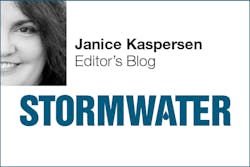
New Jersey’s governor recently signed a bill that allows cities to establish stormwater utilities and collect utility fees, something his predecessors had vetoed. The bill is known as the Clean Stormwater and Flood Reduction Act, or CSFRA, and it makes New Jersey, by some counts, the 41st state to allow utilities.
If you’ve been following the situation in the news, you’ll know that the CSFRA has been controversial, with many articles and editorials referring derisively to the “rain tax.” One state assemblyman who opposed the measure asked whether next year the state can expect a snow tax as well.
There are now many hundreds of stormwater utilities in the US, and many of them had rough beginnings. They’ve faced legal challenges, public outrage, and—perhaps even more damaging in some cases—public confusion. Several years ago, this article in Stormwater outlined common difficulties, both legal and popular, that new utilities face. This article recounts the experience of Salem, OR, in creating its utility—ultimately a successful effort, although many cities have failed in their own attempts.
New Jersey’s bill sets some ground rules for cities that form utilities, including guidelines on how the fees will be set (they should be “based on a fair and equitable approximation of the proportionate contribution of stormwater runoff from a real property”) and how property owners can qualify for reduced fees, such as by infiltrating or treating stormwater on the property. The bill also includes provisions for what happens when someone doesn’t pay the stormwater fee, including the interest rate that can be charged and further steps that are allowed, such as placing a lien on the property.
None of this is necessarily remarkable, except that in passing the CSFRA the state has perhaps made it easier for utilities to get going than it’s been in places that don’t have such comprehensive guidelines—those states that don’t prohibit utilities but don’t really encourage them either. This editorial clearly sets out the arguments for and against the CSFRA (the author supports it) and estimates that even though utilities are now possible in the state, perhaps only 40 cities, at most, will be motivated to actually set one up.
Among the legal challenges to various utilities across the country, a common one is that the municipality is not authorized to levy taxes. This is why it’s so important to distinguish between a tax and a user fee. Fees, as I wrote here in the discussion of an attempt to form a utility in Alexandria, VA, are collected for a specific purpose and are proportionate to the cost of the service provided, and unlike taxes, fees can’t be used for a purpose other than that for which they were collected. In many jurisdictions, a fee is also defined by the option for potential ratepayers to opt out of the service. In the case of a stormwater utility—and as New Jersey’s CSFRA has already anticipated—this might be accomplished by providing stormwater infiltration or treatment on one’s property. This distinction is why we avoid using the term “rain tax,” and also the reason the term is so popular with those trying to quash proposed utilities.
Have you been involved in setting up a stormwater utility, or defending an existing one? What were the particular challenges you faced? Advice you’d have for others in the same situation?
About the Author
Janice Kaspersen
Janice Kaspersen is the former editor of Erosion Control and Stormwater magazines.